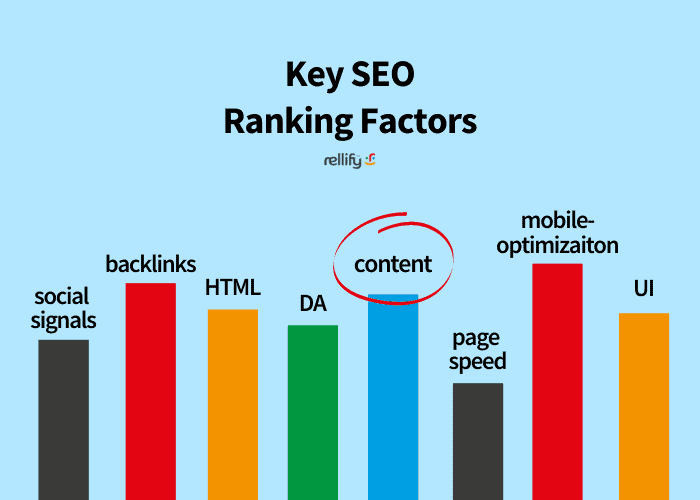SEO Friends! We all know that the Google Algorithm works by using some factors. This thread covers the most important ranking factors.
We’ll begin with the most important:
#1 Factor: Content Quality + Relevance
This is - by far - the most important factor that Google uses: How good is your content (and is it exactly what the end-user is looking for)?
The cornerstone of SEO, high-quality, relevant content is essential. Google values content that is informative, well-written, and provides value to the reader.
SemRush wrote something about it on their page:
What is "Good Content"?
Quality content is how relevant, engaging, and useful your content is for your audience. It’s well-researched, well-presented, and tailored to meet your audience’s needs. Content quality goes beyond words on the page.
To create high-quality content, you must not only understand the topic but also your audience and industry.
When talking about content, it’s common to think about blog articles and SEO.
However, good content can take many shapes and forms, like:
- Blog posts
- Videos
- Social media posts
- Ebooks
- Interactive tools
- Templates
- And more
- You just need to find the perfect format (or formats) for your customers.
#2 Usuablitity & Page Speed
Your site simply has to work. A seamless and engaging user experience can significantly lower bounce rates and increase the time spent on your site, signaling to Google the quality and relevance of your site.
Faster loading times not only enhance user experience but also contribute positively to your site’s ranking.
Remember:
- Keep it simple.
- Your site has to load FAST. No one likes slow pages.
- Make the user happy - not the search engine!!!
#3 Backlinks
Your site needs links. Reach out to other blogs or websites to get links, or simply CREATE GOOD CONTENT.
Do never, ever:
- Spam
- Buy links
Just never ever do that. Please.
Examples for Backlinks
Here are five ethical and effective strategies to acquire them:
- Guest Blogging: Offer to write articles for relevant blogs in your industry. This not only showcases your expertise but also allows you to include a backlink to your website. Ensure the content is valuable and unique to the host blog’s audience. Note: Your site has to be in the same range of topic as the blog.
- Create Shareable Content: Produce high-quality, informative, and engaging content on your site that naturally encourages sharing. This could be in-depth guides, infographics, research studies, or compelling narratives. The more share-worthy your content is, the more likely it is to garner other website owners that link to your page.
- Ask for Partnerships: Collaborate with business partners, suppliers, or clients for link exchange. You can offer to write testimonials for their services in exchange for a backlink, or feature them in a case study on your website.
- Participate in (other) Online Communities: Engage in online forums, social media groups, or Q&A sites related to your field.
- Resource Link Building: Identify websites in your niche that have resource pages and reach out to them, suggesting they include a link to your content. Your content should be a valuable addition to their resources, providing significant benefit to their audience.
These are five legitimate ways of building links to your page.
#4 Technical SEO
Just make sure your site is - technically - in good condition. Focus on:
- Speed Optimization: Ensure fast loading times by optimizing images and minimizing server requests.
- Mobile Responsiveness: A mobile-friendly design is crucial in today’s smartphone-centric world.
- Secure Website (HTTPS): Implement SSL encryption for security and trust.
- Structured Data: Use Schema markup to help search engines understand your content.
- URL Structure: Maintain clean, readable URLs.
- Error Handling: Regularly fix crawl errors and broken links.
- Duplicate Content Management: Use canonical tags to avoid duplication issues.
- Robots.txt and Sitemaps: Guide search engines effectively through your site with optimized robots.txt and XML sitemaps. Create a sitemap with Rankmath, for example, if you use Wordpress.
That’s it for now.
